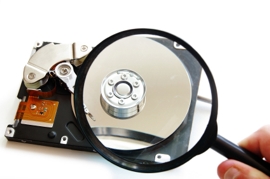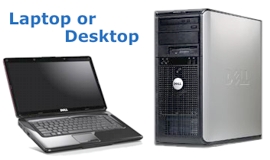|
|
 |
How Can Your Hard Drive Fail? What Can You Do About It?The hard drive in your computer is an engineering marvel, very sophisticated, amazingly small, but able to store huge amounts of data, built to the most exacting tolerances, and designed to be reasonably resistant to the slings and arrows of a sometimes-less-than-ideal environment. It is truly a wondrous little machine that the rest of your computer is designed to serve and use as its repository. But marvelous as it is, it's still a machine, and like any machine it can fail. When it does, your computer simply ceases to function. Period. Broadly speaking, there are two ways your hard drive can cease to function. The first is called logical failure. That happens when the hard drive can't access certain files or other data because the way the information is organized or stored has somehow been corrupted, compromising the logic of the system, and thus the machine's ability to retrieve and display what you want to see. The hard drive spins and functions just as it should from a mechanical standpoint, but it has lost its ability to "know" where to look for certain information stored in it. Which leads us to the second way the drive can fail to operate, mechanical failure. That can be caused by problems with the motor which spins the discs of the drive at more than 7,000 rpm, or with the "heads" that track across the surface of the magnetic medium on the discs that stores information. These heads are placed incredibly close to the surface of the disc, only about 50 nanometers away, which is about 1/2000 the diameter of a human hair. With tolerances that close, the slightest deviation of either the disc or the head can be catastrophic. Any contact between the two can damage or destroy the head, part of the magnetic medium, or both. It's called a "head crash" for a very good reason. It's easy to see that there could be a variety of causes for either of those failures: an electrical power surge, movement or vibration of the computer while the hard drive is running, dropping or jarring the computer even when it's turned off, or inadvertently dumping your soft drink over it. Surprisingly, with the right tools and knowledge, even the most disastrous hard-drive failures can be largely overcome. In the case of logical failure, special software programs have been developed that can "repair" the data that's been corrupted, or force the drive to access the portions of the disc that are inaccessible. Catastrophic mechanical failure can also be repaired, but it may require use of a "clean room" where the drive can be disassembled and the discs in the drive installed in another drive or copied and transferred to another functioning drive. That type of recovery effort may appear to be somewhat costly, however, depending on the value of the material that's stored on the drive, it can be a real bargain.
• Back to more articles, links, and resources. |

